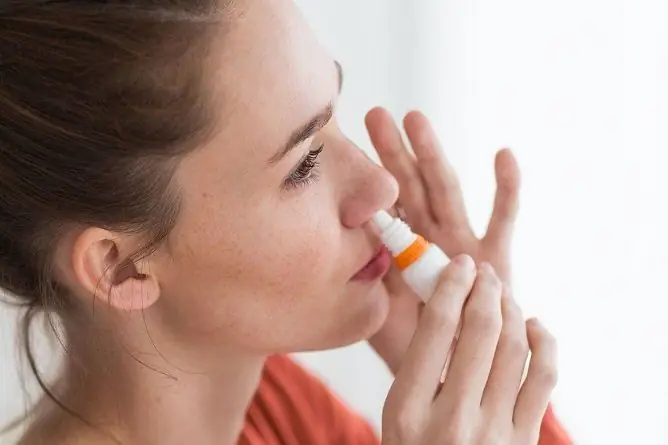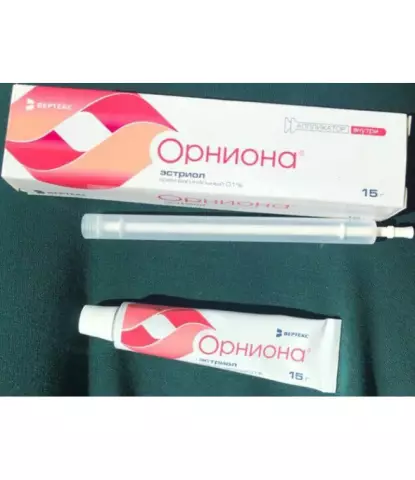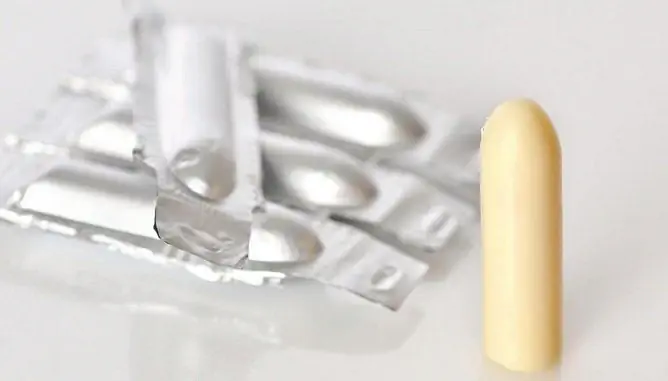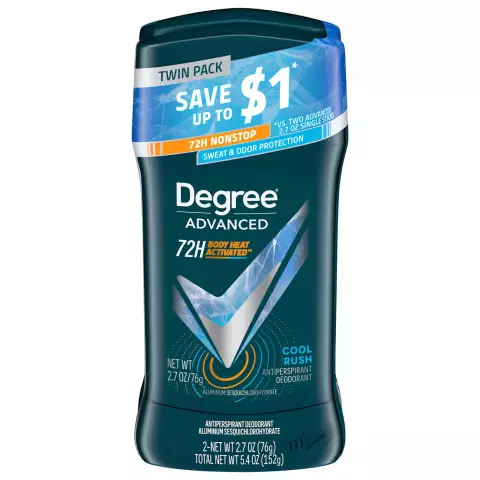- Author Rachel Wainwright wainwright@abchealthonline.com.
- Public 2023-12-15 07:39.
- Last modified 2025-11-02 20:14.
Drops in the nose from sinusitis: which are better to use
The content of the article:
-
Effective antibiotic nasal drops for sinusitis
- Isofra
- Polydexa for sinusitis
-
Other nasal drops
- Vasoconstrictor drops
- Herbal preparations
- Glucocorticoid drops
- Antihistamines and combined drops for sinusitis
- Saline solutions
- Video
Complex therapy of sinusitis - an inflammatory process in the maxillary sinus - includes the use of local medicines. Nasal drops (spray) help to improve the outflow of pathological contents, facilitate nasal breathing and accelerate recovery.

Nasal drops are prescribed as part of the complex therapy of sinusitis
Drug therapy is determined by the stage and nature of the disease. To improve the patient's condition, it is necessary to drain the sinuses. After unblocking the anastomosis, air actively enters the sinuses, which significantly improves the patient's condition.
For complete recovery, eradication (destruction) of the pathogen is carried out. Most often, the pathological process is caused by bacteria, therefore, antibiotics are the basis of treatment. They must be taken orally, and in some cases additionally dripped into the nose.
Effective antibiotic nasal drops for sinusitis
In the acute process, both systemic and local antibiotic therapy is carried out. The advantage of the latter is its high bioavailability, as well as a minimal risk of adverse reactions.
The fundamental point is that systemic antibiotics cannot be used locally, that is, antibacterial agents for which the possibility of oral and parenteral use is provided. This is due to the fact that a low concentration of the drug in the focus of inflammation can lead to the appearance of forms of bacteria that are resistant to these agents. In the future, the systemic use of these antibiotics will not provide the necessary therapeutic effect. In this regard, only drops (sprays), which are intended for nasal administration, can be used for local therapy.
Preparations in the dosage form of drops are inferior to sprays, since they do not always reach distant anatomical sites. Antibacterial nasal drops for sinusitis can be prescribed for outpatient use. Which ones, the otolaryngologist will tell you.
List of Registered Antimicrobial Nasal Sprays:
- Isofra;
- Polydex with phenylephrine.
Previously, Bioparox was actively used. However, according to recent studies, the danger of the active substance significantly exceeds its effectiveness. The drug was discontinued. However, the drug had good antibacterial activity.
Isofra
The active ingredient of Isofra is framycetin sulfate. The drug belongs to the aminoglycoside group. The drug has a detrimental effect on a wide range of pathogens. In addition, framycetin destroys the causative agent of diphtheria.

Isofra is often the drug of choice for local antibiotic therapy.
The substance is not absorbed into the bloodstream, which explains the low risk of side effects. Isofra is indicated for patients with purulent forms of rhinitis, sinusitis and rhinopharyngitis.
The drug can be administered to children from one year old. The course of treatment is 7-10 days.
Polydexa for sinusitis
Polydex with phenylephrine is a combined drug with high therapeutic activity.

Polydexa with phenylephrine is a combination drug often used to treat sinusitis
The composition includes the following substances:
- neomycin;
- dexamethasone;
- polymyxin B;
- phenylephrine.
Dexamethasone has anti-inflammatory and decongestant effects. Antibiotics (neomycin + polymyxin B) destroy the cell wall of pathogenic microorganisms. Phenylephrine is a vasoconstrictor.
The combination of two antibiotics provides an extended spectrum of action. Phenylephrine helps to drain the sinuses, improving their aeration. None of the components are absorbed into the systemic circulation. The risk of systemic adverse reactions is minimal.
These drops are used for sinusitis in adults. Children under 15 years of age are not prescribed Polydex. The course of therapy lasts from 5 to 7 days.
Other nasal drops
The pharmaceutical market offers a wide range of nasal preparations. They differ in the mode of action, have different efficacy, tolerability and duration of the action.
Vasoconstrictor drops
Decongestants, or vasoconstrictor drugs, are α-adrenergic receptor stimulants that reduce swelling of the nasal mucosa. They also suppress mucus secretion. Decongestants provide drainage of the sinuses, normalizing air exchange in them. Immediately after application, nasal breathing is restored. The general condition improves immediately.

When choosing a vasoconstrictor, the composition and duration of the action is important.
Classification of vasoconstrictor drops depending on the duration of action:
- Short-acting (up to 6 hours): Nazol Baby, Naphtizin, Tizin.
- Medium duration of action (6-8 hours): Galazolin, Snoop, Otrivin, Lazolvan Reno.
- Long-term action (more than 8 hours): Nazivin, Knoxprey, Nazol.
Preparations based on oxymetazoline (long-acting) have a virucidal effect.
Decongestants are addictive. Clinical experience and reviews show that with prolonged use, the nasal mucosa becomes thinner, and therefore increases susceptibility to ARVI (acute respiratory viral infections).
Herbal preparations
At home, you can use drugs based on natural ingredients. Herbal spray with cyclamen - Sinuforte has an active draining effect.
Plant phytoncides cause reflex secretion of mucus, which helps to cleanse the sinuses of accumulated contents. Itching, perspiration, lacrimation and increased sneezing appear immediately after application. This is a normal reaction of the body to a stimulus.
Usually a course is prescribed for up to 2 weeks.
Glucocorticoid drops
Topical glucocorticosteroids include:
- Avamis;
- Nazonex;
- Fliksonase.
Drugs from this group have a strong anti-inflammatory effect. They relieve swelling and eliminate hyperemia. By reducing swelling, sinus drainage is ensured. Means with a steroid component are prescribed for various forms of sinusitis.
Antihistamines and combined drops for sinusitis
Allergodil has a good therapeutic effect. The drug contains the substance azelastine. It is a blocker of H 1 -histamine receptors. It is used mainly for allergic forms of sinusitis.
Rinofluimucil is a combined drug that has a vasoconstrictor and mucolytic effect. It consists of two active ingredients: acetylcysteine and tuaminoheptane. The latter has a vasoconstrictor effect. Acetylcysteine dilutes the secretion, facilitating its evacuation from the sinuses.
Vibrocil contains antihistamine (dimethindene) and vasoconstrictor (phenylephrine) components. They reduce the secretion of the nasal mucosa and relieve swelling. After 5-7 minutes after application, nasal breathing is restored.
Saline solutions
Saline solutions are an integral part of sinusitis treatment. Isotonic solutions promote mechanical cleansing of the nasal mucosa, hypertonic solutions - enhanced mucus secretion and restoration of breathing.

Saline solutions are used to cleanse the nasal mucosa
List of saline solutions for nasal administration:
- Humer;
- Aqua Maris;
- Zilch;
- Aqua Spray.
If the name of the drug includes the mark "hypertonic", then it contains an increased concentration of salts. This type of solution improves sinus aeration.
Therapeutic tactics for sinusitis is determined by an otolaryngologist. The cost of the drug should not be the only selection criterion. A properly selected cheap product can be as effective as expensive drops. It must be remembered that local nasal remedies are not an alternative to traditional sinusitis treatment, but complement it.
Video
We offer for viewing a video on the topic of the article.

Yulia Evtekhova Therapist About the author
Education: Dnepropetrovsk State Medical Academy.
Work experience: Nurse of the Rheumatology Department of Dnepropetrovsk City Hospital No. 11.
Found a mistake in the text? Select it and press Ctrl + Enter.






